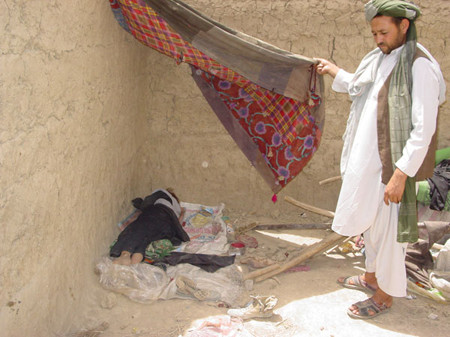No education, lack of food and winter clothes. In Afghanistan's capital Kabul, hundreds of war displaced children and their families are crying for relief assistance from the government.

Tens of thousands of people from Helmand, Zabul and Uruzgan provinces have been displaced from their villages as a result of the US/NATO bombardments and Taliban insurgency. Over 700 families are living in a IDPs camp in Charahi Qambar area of Kabul. (Photo: RAWA.org)
Currently, there are 804 families living in the slum, in west of the city, with the largest family of 15 children.
"We do not have enough food and clothes. We need help," said Wakiltawos Khan, head of the slum.
"Nine months ago, my five sons were killed by U.S. air strikes in my hometown, and my daughter lost an arm. Kabul is safe, so we moved here. But we can not afford a house and have to stay here," Wakiltawos said.
To escape the ongoing conflict, most of the families are forced to leave their hometowns in south Afghanistan's Helmand province to find a safer place to continue their life.
Over the past nine years since the beginning of the Afghan war in October 2001, the Afghan Taliban regime has collapsed, but its leader Mullah Omar and his guest Osama Ben Laden are still in escape, leaving the Afghan civilians suffering almost every day.
According to statistics released by Refugees International, over 100,000 people have been displaced in 2010 alone. There are now over 319,000 internally displaced people in Afghanistan, and the number has been rising over the past two years.
The "houses" here are made of mud, covered with plastic sheets as roofs. They were provided by United Nations High Commissioner for Refugees (UNHCR) and some Afghan donators, said Wakiltawos.
"Our government did not pay much attention to our life here. Our children are in high need of food and clothes now," another resident told us. "Last year, a Chinese businessman provided us with some plastic sheets."
Several thin dogs wandered around. Children, in rags, played outside. One of them was seen running on bare foot. They were so curious of the presence of outsiders as no one has visited the slum for a long time.
Not far from the entrance to the slum, there is a well -- the only source of drinking water in the slum. Some men and children were taking turns to pump water from the well, with no sanitary facilities.



